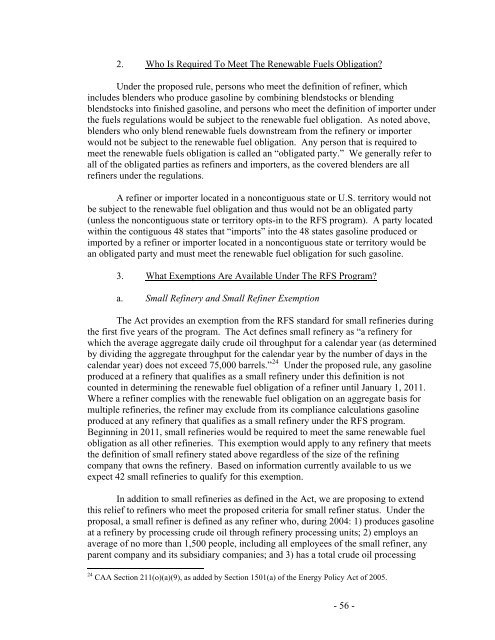Regulation of Fuels and Fuel Additives: Renewable Fuel Standard ...
Regulation of Fuels and Fuel Additives: Renewable Fuel Standard ...
Regulation of Fuels and Fuel Additives: Renewable Fuel Standard ...
You also want an ePaper? Increase the reach of your titles
YUMPU automatically turns print PDFs into web optimized ePapers that Google loves.
2. Who Is Required To Meet The <strong>Renewable</strong> <strong><strong>Fuel</strong>s</strong> Obligation?<br />
Under the proposed rule, persons who meet the definition <strong>of</strong> refiner, which<br />
includes blenders who produce gasoline by combining blendstocks or blending<br />
blendstocks into finished gasoline, <strong>and</strong> persons who meet the definition <strong>of</strong> importer under<br />
the fuels regulations would be subject to the renewable fuel obligation. As noted above,<br />
blenders who only blend renewable fuels downstream from the refinery or importer<br />
would not be subject to the renewable fuel obligation. Any person that is required to<br />
meet the renewable fuels obligation is called an “obligated party.” We generally refer to<br />
all <strong>of</strong> the obligated parties as refiners <strong>and</strong> importers, as the covered blenders are all<br />
refiners under the regulations.<br />
A refiner or importer located in a noncontiguous state or U.S. territory would not<br />
be subject to the renewable fuel obligation <strong>and</strong> thus would not be an obligated party<br />
(unless the noncontiguous state or territory opts-in to the RFS program). A party located<br />
within the contiguous 48 states that “imports” into the 48 states gasoline produced or<br />
imported by a refiner or importer located in a noncontiguous state or territory would be<br />
an obligated party <strong>and</strong> must meet the renewable fuel obligation for such gasoline.<br />
3. What Exemptions Are Available Under The RFS Program?<br />
a. Small Refinery <strong>and</strong> Small Refiner Exemption<br />
The Act provides an exemption from the RFS st<strong>and</strong>ard for small refineries during<br />
the first five years <strong>of</strong> the program. The Act defines small refinery as “a refinery for<br />
which the average aggregate daily crude oil throughput for a calendar year (as determined<br />
by dividing the aggregate throughput for the calendar year by the number <strong>of</strong> days in the<br />
calendar year) does not exceed 75,000 barrels.” 24 Under the proposed rule, any gasoline<br />
produced at a refinery that qualifies as a small refinery under this definition is not<br />
counted in determining the renewable fuel obligation <strong>of</strong> a refiner until January 1, 2011.<br />
Where a refiner complies with the renewable fuel obligation on an aggregate basis for<br />
multiple refineries, the refiner may exclude from its compliance calculations gasoline<br />
produced at any refinery that qualifies as a small refinery under the RFS program.<br />
Beginning in 2011, small refineries would be required to meet the same renewable fuel<br />
obligation as all other refineries. This exemption would apply to any refinery that meets<br />
the definition <strong>of</strong> small refinery stated above regardless <strong>of</strong> the size <strong>of</strong> the refining<br />
company that owns the refinery. Based on information currently available to us we<br />
expect 42 small refineries to qualify for this exemption.<br />
In addition to small refineries as defined in the Act, we are proposing to extend<br />
this relief to refiners who meet the proposed criteria for small refiner status. Under the<br />
proposal, a small refiner is defined as any refiner who, during 2004: 1) produces gasoline<br />
at a refinery by processing crude oil through refinery processing units; 2) employs an<br />
average <strong>of</strong> no more than 1,500 people, including all employees <strong>of</strong> the small refiner, any<br />
parent company <strong>and</strong> its subsidiary companies; <strong>and</strong> 3) has a total crude oil processing<br />
24 CAA Section 211(o)(a)(9), as added by Section 1501(a) <strong>of</strong> the Energy Policy Act <strong>of</strong> 2005.<br />
- 56 -
















